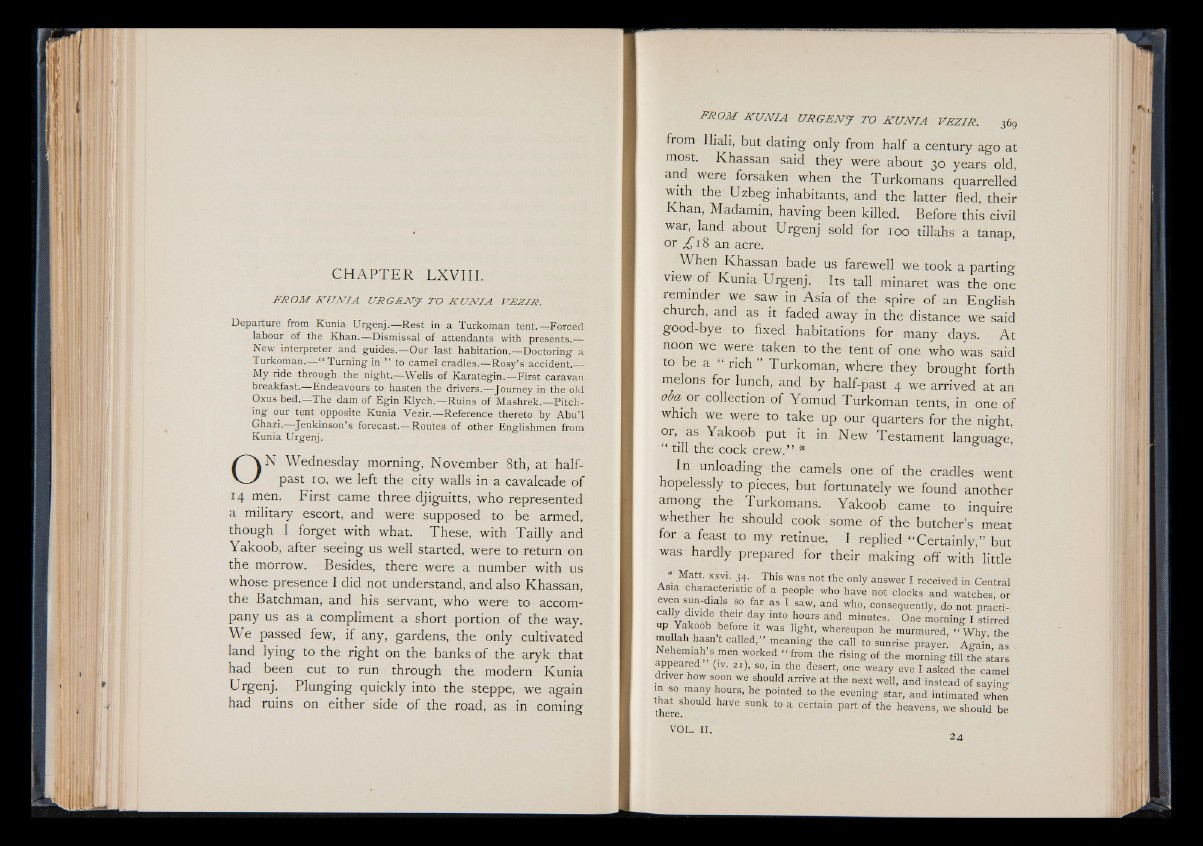
C H A P T E R L X V I I I .
FROM K U N IA U R G EN J TO K U N IA VEZIR.
Departure from Kunia Urgenj.— Rest in a Turkoman tent.—Forced
labour of the Khan.-^Dismissal of attendants with presents.—
New interpreter and guides.—Our last habitation.—Doctoring a
Turkoman.— “ Turning in ” to camel cradles.— Rosy’s accident.*!
My ride through the night.—Wells of Karategin.—First caravan
breakfast.— Endeavours to. hasten the drivers.— Journey in the old
Oxus bed.—The dam of Egin Klych.—Ruins of Mashrek.— Pitching
our tent opposite Kunia Vezir.— Reference thereto by Abu’l
Ghazi. Jenkinson’s forecast.— Routes of other Englishmen from
Kunia Urgenj.
ON Wednesday morning, November 8th, at halfpast
10, we left the city walls in a cavalcade of
14 men. First came three djiguitts, who represented
a military escort, and were supposed to be armed,
though I forget with what. These, with Tailly and
Yakoob, after seeing us well started, were to return on
the morrow. Besides, there were a number with us
whose presence I did not understand, and also Khassan,
the Batchman, and his servant, who were to accompany
us as a compliment a short portion of the way.
W e passed few, if any, gardens, the only cultivated
land lying to the right on thé banks of the aryk that
had been cut to run through the. modern Kunia
Urgenj. Plunging quickly into the steppe, we again
had ruins on either side of the road, as in coming
from Iliali, but dating only from half a century ago at
most. Khassan said they were about 30 years old,
and were forsaken when the Turkomans quarrelled
with the Uzbeg inhabitants, and the latter filed, their
Khan, Madamin, having been killed. Before this civil
war, land about Urgenj sold for 100 tillahs a tanap,
or £ 18 an acre.
^ When Khassan bade us farewell we took a parting
view o f Kunia Urgenj. Its tall minaret was the one
reminder we saw in Asia of the spire of an English
church, and as it faded away in the distance we said
good-bye to fixed habitations for many days. A t
noon we were ^taken to the tent o f one who was said
to be a “ r ich ” Turkoman, where they brought forth
melons for lunch, and by half-past 4 we arrived at an
oba or collection of Yomud Turkoman tents, in one of
which we were to take up our quarters for the night,
or, as Yakoob put it in New Testament lang-uag-e
“ till the cock crew.” *
In unloading the camels one of the cradles went
hopelessly to pieces, but fortunately we found another
among the Turkomans. Yakoob came to inquire
whether he should cook some of the butcher’s meat
for a feast to my retinue, I replied “ Certainly,” but
was hardly prepared for their making off with little
* Matt. xxvi. 34. This was not the only answer I received in Central
Asia characteristic of a people who have not clocks and watches or
even sun-dials so far as I saw, and who, consequently, do not practi-
M & j g l * .eir day mt0 ^ u r s and minutes. One morning I stirred
11 A before it was light, whereupon he murmured, “ Why the
mullah hasnt eaUed,” meaning the call to sunrise prayer. Again, as
Nehemiah s men worked “ from the rising of the morning till the stars
appeared (iv. 21), so, in the desert, one weary eve I asked the camel
driver how spon we should arrive at the next well, and instead of saying
S w H l f i k°urs< he pointed to the evening star, and intimated when
there t0 * ¡3 1 1 Part °f th® heavens, we should be
VOL. II.